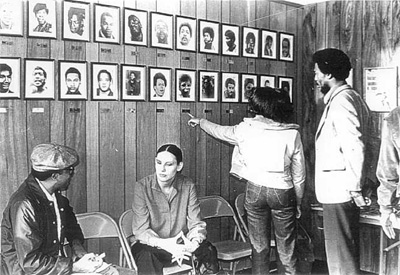|
Zenobia Embry-Nimmer -- poor's voice
- Kevin Fagan, Chronicle Staff Writer
Tuesday, September 13, 2005
It was raining and bitterly cold on the morning Zenobia Embry-Nimmer stepped
into a half-constructed house in East Oakland to find street minister Henry
Robinson dying on his couch, kitchen stove burners cranked up high in a vain
attempt to ward off the chill. Ms. Embry-Nimmer had heard her old friend had
AIDS, and on this rainy day when she found it was true -- and that nobody was
helping -- fury filled her face.
"This is so very, very wrong, and, by God, I'm going to do something about
it," she seethed, stomping away from the house.
That was in December 1991. In short order, Robinson was placed in a hospital
with round-the-clock care -- and when he died a month later, he did so with
dignity, instead of shivering in his house alone. "Zenobia is an angel," he
whispered to a reporter a day before his death.
A lot of people thought that of Ms. Embry-Nimmer, one of the most ardent
advocates for the poor and homeless in Alameda County for the past two
decades. When her time came to die Monday at 1:45 a.m. at Summit Hospital in
Oakland, at age 57 after a two-year battle with cancer, they couldn't find
enough adjectives to describe her.
"She was a warrior in the truest sense," said Boona Cheema, executive director
of the Berkeley-based nonprofit Building Opportunities for Self-Sufficiency.
"In moments like now, after Hurricane Katrina, is when her spirit comes forth
for me -- you know, to speak the truth. That's what she did extremely well, no
matter how influential the people were who she was talking to."
Ms. Embry-Nimmer was perhaps best known as the executive director of the
Emergency Services Network from 1989 to 1993, an organization routing the
resources of nearly 200 poverty-aid agencies in Alameda County. When the 1989
Loma Prieta earthquake shattered more than 1,000 units of low-income housing
in the county, Ms. Embry-Nimmer was in a key position to push for it to be
rebuilt with governmental disaster aid -- and she did so with a vengeance,
becoming the best-known voice for the poor, the homeless and their housing
needs.
In the end, millions of dollars, including $10 million from the Federal
Emergency Management Agency, went into replacing the units with double the
numbers that were there before.
"She was a tireless fighter for individuals who in most cases didn't have a
public voice to go to decisionmakers," said Alameda County Board of
Supervisors Chairman Keith Carson, who during the quake was an aide to then-
Rep. Ron Dellums, D-Oakland. "She was consistent and articulate and to the
point as their spokesperson, and even if it made policymakers uncomfortable,
she made us take in the information."
One of her chief skills was that she was equally at home with the poor and in
the halls of power.
"Zenobia felt extremely comfortable around people in the street, who felt
angry -- but she also had a background of being educated and knowing how to
approach government," Carson said. "She was unique that way."
Former Oakland Mayor Elihu Harris remembered Ms. Embry-Nimmer being especially
adamant about the creation of Oakland's Henry Robinson Multi-Service Center,
which opened in 1993 in memory of her street-preaching friend and offers the
homeless everything from housing to job counseling.
"One reason we don't have the problem with homelessness in Oakland that you
see in San Francisco is because of that center," Harris said. "Now, I wonder
who will be inspired to take up the baton after she is gone?"

Zenobia sitting in chair at the BPP Central HQ in 1977
Ms. Embry-Nimmer was born in Emporia, Kan., to Robert and Katherine Embry. She
recalled in the book, "Black, White, Other," by Lise Funderburg, seeing a
black man burned to death when she was 8 -- and that experience, combined with
being homeless herself in the Bay Area for two years after moving here in
1967, ignited her life's passion.
"How can anyone walk by and not help?" she told a reporter, eyes moist, while
walking through Loma Prieta rubble passing out food to the homeless.
Ms. Embry-Nimmer earned a bachelor's degree in psychology from the University
Without Walls in the early 1970s and over the next two decades became a
counselor or director at several Bay Area agencies aiding substance abusers or
the impoverished, including the Drug Awareness Program and Upward Bound. Proud
of her mixed Cherokee and African American heritage, she was also active in
Native American and black organizations, including helping re-form the Black
Panther Party in the 1990s.
"She loved to say that when she was a kid and watched cowboy and Indian
movies, she always rooted for the Indians," said her husband of 27 years,
Richard Nimmer.
After leading the Emergency Services Network, Ms. Embry-Nimmer was a director
at Satellite Senior Homes, Dignity Housing West and the Workforce Development
Collaborative. In 2003 she was diagnosed with cancer and quit working to try
to beat the disease at home in Oakland.
"She made most people she knew into better people, right up to the end," said
Richard Nimmer.
In addition to her husband and her parents, Ms. Embry-Nimmer is survived by
two daughters, Lynn Marie Embry-Nimmer of Northridge (Los Angeles County) and
Michelle Smith of Los Angeles; a sister, Lynn Marie Barnes of Alaska; and a
brother, Robert Embry of Antioch.
Memorial services are pending.
Page B - 5
URL:
sfgate.com/cgi-bin/article.cgi?file=/chronicle/archive/2005/09/13/BAGP6EMNMV1.DTL
|
